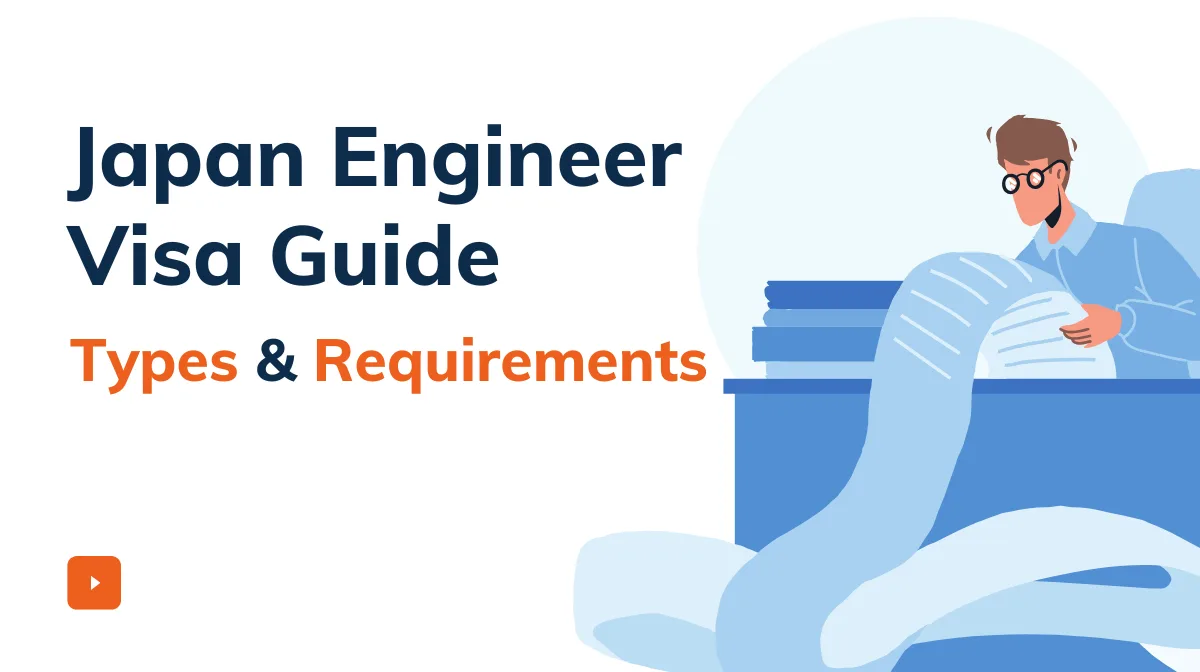Foreign nationals who wish to work as engineers in Japan must obtain a work visa.
To get a visa, you need a “residence status” and for engineers, there are two main options the “Engineer/Specialist in Humanities/International Services Visa” and the “Highly Skilled Professional Visa”
This article explains the characteristics of each visa, application procedures, required documents, and long-term career planning for foreign engineers in Japan.
- Types of working visas available for engineers in Japan.
- Step-by-step application process for Japanese work visas.
- Long-term career planning for foreign engineers in Japan.
1. Basics of Japanese Work Visas for Engineers

To work as an engineer in Japan, you need a “work visa” Generally, a work visa is used as a “residence status” that permits work in Japan.
However, formally, it refers to the visa obtained after acquiring the appropriate residence status and submitting a Certificate of Eligibility.
To obtain a work visa, you must first acquire a residence status, which comes in many varieties. We will explain those relevant to engineers.
Reference: Ministry of Foreign Affairs: Work Visa
Types of Residence Status Relevant to Engineers
The types of jobs foreign nationals can work in Japan are determined by their residence status.
Common occupations include engineers, interpreters, and other jobs requiring specialized knowledge or skills. There are also new residence statuses for highly skilled foreign professionals and specified skilled workers.
As exceptions, those with residence statuses such as permanent resident, spouse of a Japanese national, or long-term resident have no restrictions on their activities in Japan. Students can also work part-time up to 28 hours per week in any job type.
It’s important for foreign nationals to obtain the residence status that matches their occupation to work in Japan.
For engineers, the main options are the “Engineer/Specialist in Humanities/International Services Visa” and the “Highly Skilled Professional Visa”
Reference: Immigration Services Agency: List of Residence Statuses
Overview of the Engineer/Specialist in Humanities/International Services Visa
This is a common residence status for working in Japan. It’s designed for foreign nationals who want to work in research, development, management, etc., using their advanced specialized knowledge and skills at Japanese universities or companies.
This visa targets specialists in humanities, sciences, and foreign cultures, and was established to promote the internationalization of Japanese society. It requires certain academic credentials or experience.
Reference: Immigration Services Agency: “Engineer/Specialist in Humanities/International Services”
Basic Requirements for the Highly Skilled Professional Visa
The Highly Skilled Professional Visa was established to attract foreign nationals with advanced specialized knowledge and skills who can contribute to Japan’s economic development.
It uses a point-based system that evaluates education, work experience, annual income, and other factors. You can obtain this visa by scoring a certain number of points or higher.
There are two types of Highly Skilled Professional visas: Type 1 and Type 2, which differ in permitted activities and preferential treatment. Type 2 can be obtained after engaging in activities under Type 1 or “Designated Activities” status for at least three years.
Foreign professionals who obtain this status can engage in activities in Japan for a longer and more stable period, and companies benefit from securing such talent.
Reference: Immigration Services Agency: Highly Skilled Professional
How to Choose the Right Residence Status for Engineers
Work visas are issued based on residence status. When choosing, you need to understand the characteristics and requirements of each.
For engineers to obtain “Engineer/Specialist in Humanities/International Services,” they must meet the “Engineer” requirements. However, requirements for education and work experience may be relaxed if you have qualifications related to information processing technology.
For “Highly Skilled Professional,” engineers applying for the first time can obtain Type 1. This requires scoring 70 points or more in the point-based system.
How to Check Basic Requirements for Application
If you have questions about work visas, you should contact the Japanese embassy or consulate in your country.
For information about types of residence status applications and basic requirements, refer to the Immigration Services Agency website.
You can also contact the Regional Immigration Services Bureau or the Foreign Residents Information Center.
2. Concrete Preparation Steps for Residence Status Applications

Here we explain the residence status application essential for a work visa.
Basically, the residence status application is done by the applicant themselves. However, preparing documents may require coordination with your prospective employer, and sometimes professional assistance.
The application should be submitted to the Regional Immigration Services Bureau with jurisdiction over the area where you plan to live or where your prospective company is located.
Preparation and Verification of Required Documents
Required documents vary by residence status, but common documents
- Application for Certificate of Eligibility
- Personal photo (4cm×3cm)
- One return envelope
- Materials related to your activities in Japan, such as company documents and employment contract
You may also need to submit a resume and documents proving your education and work experience.
Reference: Immigration Services Agency: Application for Certificate of Eligibility
Checking Required Materials with Your Prospective Employer
Coordination with your prospective employer is important when applying for a residence status. Many of the required “materials related to your activities in Japan” need to be prepared by the company, such as the company registration certificate, information brochures, and employment contract.
You should discuss and prepare these with your prospective employer in advance.
Timeline from Application to Acquisition
When planning the period from the Certificate of Eligibility application to entering Japan, you need to consider not only the examination period but also the time needed for document preparation and mailing.
According to the Immigration Services Agency, as of 2024, the average examination period for the “Engineer/Specialist in Humanities/International Services” Certificate of Eligibility application is about 2-3 months, but the actual time may be longer when you include document preparation and mailing.
Applications tend to take longer at the beginning of the fiscal year due to a higher volume of applications. Therefore, when planning your travel to Japan, it’s important to establish a schedule with sufficient buffer time.
Reference: Immigration Services Agency: Processing Time for Residence Examination
Breakdown of Application Costs
The fee for a new Certificate of Eligibility application is free.
For “Extension of Period of Stay” or “Change of Status of Residence,” the fee is 4,000 yen (subject to change). Additionally, you’ll have expenses for photo taking and return postage.
Reference: Immigration Services Agency: Application for Certificate of Eligibility
■日本でエンジニアとしてキャリアアップしたい方へ
海外エンジニア転職支援サービス『 Bloomtech Career 』にご相談ください。「英語OK」「ビザサポートあり」「高年収企業」など、外国人エンジニア向けの求人を多数掲載。専任のキャリアアドバイザーが、あなたのスキル・希望に合った最適な日本企業をご紹介します。
▼簡単・無料!30秒で登録完了!まずはお気軽にご連絡ください!
Bloomtech Careerに無料相談してみる
3. Understanding the Points-Based System for Highly Skilled Professionals

The Highly Skilled Professional visa offers the benefit of enabling more stable and long-term activities in Japan.
However, obtaining it requires scoring 70 points or more in the points-based system. Below, we explain the overview of this point system.
Point Calculation Guide for IT Professionals
The points-based system for highly skilled professionals is an evaluation system established to accept foreign nationals with advanced specialized knowledge and skills.
It classifies activities into three categories: advanced academic research activities, advanced specialized/technical activities, and advanced business management activities. Points are assigned based on education, work experience, annual income, age, etc.
Those who score a certain number of points or higher can receive various preferential measures, such as relaxed requirements for permanent residence applications.
Through this system, foreign nationals with advanced abilities can work in Japan with priority, and domestic companies can objectively evaluate and strategically accept foreign talent.
Point Distribution for High Scores
Specific point distribution
- Education: Doctoral degree 30 points, Master’s degree 20 points
- Work experience: 5 to 25 points depending on years of practical experience
- Annual income: 10 to 40 points in increments of 5 points for every 1 million yen from 4 million to 10 million yen
- Age: 15 points for up to 29 years old, 10 points for up to 34 years old, 5 points for up to 39 years old
- Research achievements: Patents, number of papers, etc. are eligible for additional points
Additional points are also awarded for graduating from a Japanese university, passing the N1 level of the Japanese Language Proficiency Test, etc.
Required Certificates and How to Prepare Them
To obtain Highly Skilled Professional Type 1 status as an engineer, you need the following documents
- Application for Certificate of Eligibility
- Photo
- Return envelope
- Materials related to your occupation
- Points calculation table
- Materials showing you have 70 points or more, etc.
Preparation of these documents may require applications to your prospective employer, university of graduation, etc., so check in advance.
After receiving the Certificate of Eligibility, you need to apply for an entry visa at a Japanese embassy or consulate.
Reference: Immigration Services Agency: Highly Skilled Professional
Details of Preferential Treatment
Engineers who obtain Highly Skilled Professional Type 1 status receive various preferential treatments, including permission for multiple activities and a maximum stay period of 5 years.
Examples of preferential treatment
- Permission to run a business alongside research activities
- Relaxed requirements for permanent residence
- Prioritized immigration and residence procedures
- (For those with 80 points or more) Eligibility to apply for permanent residence after 1 year of residence
- Permission for spouse to work under certain conditions
Additionally, parents or housekeepers may also be allowed to accompany you if you meet certain requirements, such as if you or your spouse is pregnant.
4. Important Checkpoints When Applying for a Visa

When applying for a work visa, be mindful of the following checkpoints regarding the Certificate of Eligibility and related documents.
Procedures for Obtaining a Certificate of Eligibility
The most important aspect of a work visa application is the Certificate of Eligibility. Having this certificate increases the likelihood of a smooth work visa application.
However, as mentioned earlier, various procedures are necessary to get the residence status approved.
Also, work visas correspond to specific residence statuses. For example, if your status is “Engineer/Specialist in Humanities/International Services” you can only apply for a visa that corresponds to this status.
Actual Examination Period and Progress Checking
The Certificate of Eligibility has a validity period, generally 3 months. After this period, it becomes invalid, and you need to apply again.
Therefore, when entering Japan from overseas, you need to obtain the certificate and apply for a work visa based on the planned entry date.
The visa examination period itself is typically about 1 week, but considering preparation for obtaining the status, you should allow about 3 months. Apply with ample time while checking your preparation progress.
How to Respond If Additional Documents Are Requested
During the Certificate of Eligibility application process, you may receive a “Request for Additional Documents” regarding your submitted documents.
It’s crucial to respond completely and within the deadline to what’s requested in this notice.
Failure to meet the deadline or respond to questions may result in application denial. If you can’t prepare the documents within the deadline, contact the Immigration Bureau in advance to explain your situation, which may grant you an extension.
■日本でエンジニアとしてキャリアアップしたい方へ
海外エンジニア転職支援サービス『 Bloomtech Career 』にご相談ください。「英語OK」「ビザサポートあり」「高年収企業」など、外国人エンジニア向けの求人を多数掲載。専任のキャリアアドバイザーが、あなたのスキル・希望に合った最適な日本企業をご紹介します。
▼簡単・無料!30秒で登録完了!まずはお気軽にご連絡ください!
Bloomtech Careerに無料相談してみる
5. Long-Term Career Planning for Engineers

If you aim to work in Japan long-term, you should consider visa renewal, permanent residence, bringing family members, and changes in status due to career advancement.
Visa Renewal Procedures and Considerations
For representative residence statuses in Japan such as Engineer/Specialist in Humanities/International Services and Highly Skilled Professional, you need to renew your period of stay to extend your stay.
However, for renewal, you must meet conditions such as
- Complying with status requirements
- Meeting landing criteria
- Having good conduct
- Paying taxes, etc.
Check the details in advance.
Preparation for Permanent Residence
Obtaining permanent residence eliminates restrictions on period of stay and work, allowing you to engage in occupations other than engineering.
However, the requirements are strict: for Engineer/Specialist in Humanities/International Services, you generally need over 10 years of residence in Japan, over 5 years of work in your residence status, and an annual income exceeding a certain amount (guideline is 3 million yen) for 5 consecutive years. You must prepare in advance with your future in mind.
Reference: Immigration Services Agency: Guidelines for Permanent Residence Permission
Specific Procedures for Bringing Family Members
Under Engineer/Specialist in Humanities/International Services, you can bring your spouse and children based on the “Dependent” residence status. Under Highly Skilled Professional, with additional conditions, you can also bring your parents based on the “Designated Activities” residence status.
The specific procedure is for you to apply at the local Immigration Bureau. The examination period is about 1-3 months, and after the Certificate of Eligibility is issued, you send it to your family, who then get a visa from the Japanese embassy and enter Japan.
Reference: Immigration Services Agency: Residence Status “Dependent” and “Designated Activities”
Status Changes Due to Career Advancement
Even if you’re working under Engineer/Specialist in Humanities/International Services status, you can change to Highly Skilled Professional if you meet the requirements. This status change offers the benefit of being able to stay and work in Japan for a longer and more stable period.
6. Common Challenges in Work Visa Applications and Specific Solutions

Here we explain the challenges you may face when applying for a work visa.
How to Meet Educational Requirements
Residence statuses needed for work visas require proving your ability through education, work experience, or qualifications. For instance, the “Engineer/Specialist in Humanities/International Services” visa often requires graduation from a science-related department.
Examination is done based on documents, so preparation of certificates such as graduation certificates is essential. To meet the educational requirements for residence status, you must have documents that can verify your education.
Effective Methods for Obtaining Work Experience Certification
A job offer from a company is essential for application. The job offer proves that the applicant’s skills match the job content. For example, an IT engineer applying for an “Engineer/Specialist in Humanities/International Services” visa needs a job offer as an IT engineer.
To demonstrate employment stability, a contract period of at least one year is generally required. Contract employees or dispatched workers may also pass the examination with an appropriate employment contract. Be sure to consult with your prospective employer to obtain the necessary documents.
Specific Responses to Economic Proof Requirements
There is also an examination of your economic foundation during your stay. Therefore, you may be asked to provide proof of salary level, savings, etc.
You should prepare copies of employment contracts issued by your prospective employer, bank balance certificates, etc.
Strategies for Japanese Language Proficiency Requirements
Depending on the job content, Japanese language proficiency may be required for the application.
Particularly for “translation and interpretation” or for engineers who frequently communicate with Japanese people, it’s advisable to prove your ability with qualifications such as the Japanese Language Proficiency Test.
For jobs that don’t require Japanese, language proficiency is not subject to examination.
Reference: Japanese Language Proficiency Test (JLPT)
7. Final Checklist for Successful Visa Application

To obtain a work visa, the residence status is very important. Without a Certificate of Eligibility, obtaining a work visa is practically impossible.
Since obtaining residence status is essential for a successful visa application, you need to check it thoroughly.
Final Checkpoints for Submitted Documents
Be sure to do a final check when submitting residence status application documents. The following “materials related to your activities in Japan” are definitely necessary:
□ Application for Certificate of Eligibility
□ Personal photo
□ Return envelope
□ Materials from your employer, employment contract, etc.
There may be cases where other documents are required, so check with your prospective employer and the Regional Immigration Services Bureau where you will submit your application.
Common Deficiencies and Specific Countermeasures
A common deficiency in status applications is failing to satisfy the three elements of “who” “where” and “what kind of work” These elements are equally important, and missing even one may result in denial.
Each element has detailed requirements, and “compliance with laws and regulations” in particular is strictly examined. In your application, it’s important not only to prove that you meet these requirements but also to clearly highlight this in your documents.
Cases Where You Should Consult Experts
For residence status applications, administrative scriveners or other experts can act on your behalf if requested. Consider consulting them if you’re unsure about which occupation category you meet the requirements for.
Procedures for bringing family members or when additional documents are requested are other cases where expert assistance can help things go more smoothly.
8. Aim for Visa Acquisition in Japan with Perfect Planning and Preparation
Obtaining a work visa in Japan is an important process that requires careful preparation and planning.
Especially for engineers, with options like the Engineer/Specialist in Humanities/International Services Visa and the Highly Skilled Professional Visa, proper judgment based on your career plan is required.
The key to success is to proceed with a long-term perspective and plan, from preparing necessary documents to application procedures, and even future permanent residence acquisition.

















